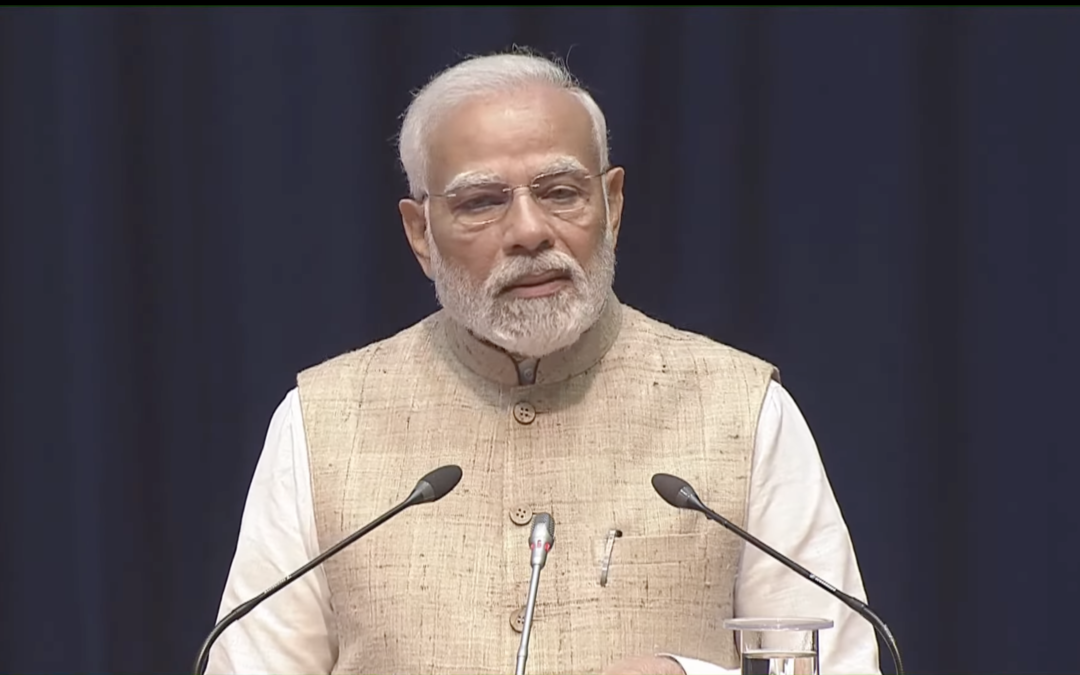Prime Minister Narendra Modi
“We are soon going to become the third-largest economy in the world. Experts are saying that India’s contribution to the world’s growth is going to be around 20 per cent very soon,” Prime Minister Narendra Modi noted.
New Delhi: Prime Minister Narendra Modi on Saturday said the country will soon become the world’s third-largest major economy and asserted that the government will continue with reforms to make India a developed nation by 2047.
Modi said the next-generation GST reform process will be completed before this Diwali. It will make the GST law simpler and bring down prices.
The Prime Minister asked the private sector to increase investment in research & development in various sectors, including clean energy, quantum technology, battery storage, advanced materials and biotechnology.
Speaking at the Economic Times World Leaders Forum, the Prime Minister said India is the fastest-growing major economy in the world today.
“We are soon going to become the third-largest economy in the world. Experts are saying that India’s contribution to the world’s growth is going to be around 20 per cent very soon,” he noted.
The growth and resilience seen in the Indian economy are due to macroeconomic stability in the last 10 years, Modi said.
On key economic fundamentals, the Prime Minister said India’s fiscal deficit has been reduced to 4.4 per cent despite challenges posed by the COVID pandemic.
Indian companies are raising record funds from capital markets, he pointed out.
Banks are much stronger now, inflation is very low, interest rates are low, and the current account deficit is in control, he asserted, adding that forex reserves are strong.
Every month, the Prime Minister said, lakhs of domestic investors are putting thousands of crores in the capital market through SIPs.
When economic fundamentals are strong, the positive impact could be seen all around, he added.
The Prime Minister also asked the private sector to increase investment in research and development in sectors like clean energy, quantum technology, battery storage, advanced materials and biotechnology. This will strengthen the resolve of a developed India.
“It is not in my nature to be satisfied with what has already been achieved. The same approach guides our reforms,” he said.
“With this arsenal of next-generation reforms, manufacturing in India will increase, market demand will rise, the industry will receive a new boost, new employment opportunities will be created, and both Ease of Living and Ease of Doing Business will improve,” he pointed out.
“Guided by the mantra of Reform, Perform, Transform, India today is in a position to help lift the world out of slow growth,” PM Modi said.
The Prime Minister said that in the global context, one can realise the strength of India’s economy.
He said this growth and resilience in the economy are due to the macroeconomic stability that India has achieved in the last decade. Today, the fiscal deficit is expected to come down to 4.4 per cent.
The Prime Minister said India is working with full force toward its goal of becoming a developed nation by 2047, and the basis of a developed India is a self-reliant India.
He also pointed out that the country needs to focus on three parameters for a self-reliant India — speed, scale, and scope.
The Prime Minister said that until 2014, India’s automobile exports stood at approximately Rs 50,000 crore annually. Today, India exports automobiles worth Rs 1.2 lakh crore a year.
PM Modi also shared that India is set to achieve another milestone by exporting electric vehicles to 100 countries, and a major event related to this achievement will take place on August 26.
Modi noted that the latest June EPFO data shows that 22 lakh formal jobs have been added, the highest-ever in a single month.
Retail inflation is at the lowest level since 2017.
“For us, reforms are neither a compulsion nor a crisis driver, but a matter of commitment and conviction,” he said.
Modi said the government evaluates and assesses each sector in a holistic manner before undertaking a series of reforms.
The Prime Minister said that during the just concluded Mosnoon session of parliament, the government continued with reforms despite disruptions caused by the Opposition parties.

